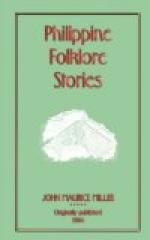Suddenly the room was filled with a blinding light, and when Larina could see once more, in place of the old woman stood a beautiful fairy holding the now well Mangita in her arms.
She pointed to Larina and said, “I am the poor woman who asked for rice. I wished to know your hearts. You were cruel and Mangita was kind, so she shall live with me in my island home in the lake. As for you, because you tried to do evil to your good sister, you shall sit at the bottom of the lake forever, combing out the seeds you have hidden in your hair.” Then, she clapped her hands and a number of elves appeared and carried the struggling Larina away.
“Come,” said the fairy to Mangita, and she carried her to her beautiful home, where she lives in peace and happiness.
As for Larina, she sits at the bottom of the lake and combs her hair. As she combs a seed out, another comes in, and every seed that is combed out becomes a green plant that floats out of the lake and down the Pasig.
And to this day people can see them, and know that Larina is being punished for her wickedness.
How the World Was Made
This is the ancient Filipino account of the creation.
Thousands of years ago there was no land nor sun nor moon nor stars, and the world was only a great sea of water, above which stretched the sky. The water was the kingdom of the god Maguayan, and the sky was ruled by the great god Captan.
Maguayan had a daughter called Lidagat, the sea, and Captan had a son known as Lihangin, the wind. The gods agreed to the marriage of their children, so the sea became the bride of the wind.
Three sons and a daughter were born to them. The sons were called Licalibutan, Liadlao, and Libulan, and the daughter received the name of Lisuga.
Licalibutan had a body of rock and was strong and brave; Liadlao was formed of gold and was always happy; Libulan was made of copper and was weak and timid; and the beautiful Lisuga had a body of pure silver and was sweet and gentle. Their parents were very fond of them, and nothing was wanting to make them happy.
After a time Lihangin died and left the control of the winds to his eldest son Licalibutan. The faithful wife Lidagat soon followed her husband, and the children, now grown up, were left without father or mother. However, their grandfathers, Captan and Maguayan, took care of them and guarded them from all evil.
After a time, Licalibutan, proud of his power over the winds, resolved to gain more power, and asked his brothers to join him in an attack on Captan in the sky above. At first they refused; but when Licalibutan became angry with them, the amiable Liadlao, not wishing to offend his brother, agreed to help. Then together they induced the timid Libulan to join in the plan.
When all was ready the three brothers rushed at the sky, but they could not beat down the gates of steel that guarded the entrance. Then Licalibutan let loose the strongest winds and blew the bars in every direction. The brothers rushed into the opening, but were met by the angry god Captan. So terrible did he look that they turned and ran in terror; but Captan, furious at the destruction of his gates, sent three bolts of lightning after them.




